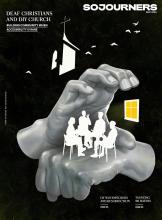THE EASTER SEASON provokes a desire in me to find hope and joy again. I don’t want to wallow in misery just because my limited vision can see only a bleak future. Instead, I am choosing to seek hope and joy because I believe that God does indeed empower and guide us. I claim the daily practice of putting my hope in the divine, not our human condition. God seeks our well-being. We must remember this amid the onslaught of trauma brought on by humanity failing to do the right thing.
The post-Easter reflections are more positive in tone. I chose to be optimistic because life goes on, we still have good work to do, and the fight does not end. We still have to care for one another, and we hope that others will care for us. In all of these, I hope that we will find once again the power of prayer and divine love. There are resources we can seek for help, guidance, and support, and I am one of many who have received such generosity and kindness. I invite you to find your own versions of the divine and/or the mystical. The immaterial and unseen surround us, guiding us, especially in our moments of despair and need.
I end my reflection with a prayer for people and nations that are going through turmoil and upheaval. Join me in offering a prayer that we may bring peace wherever we can.
Read the Full Article

